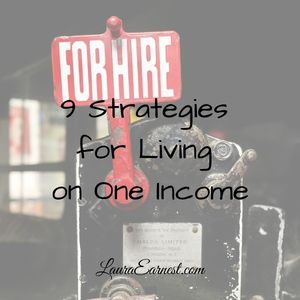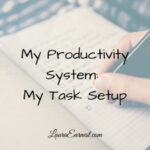It’s funny – I wrote this article in 2009, when we were suddenly faced with my job laying me off. It’s interesting that so many people are facing the same thing so many years later.
With the economy tanking, and people facing job loss at record levels, I thought I would share what I learned from my three months of unemployment. Note: I was not eligible for unemployment compensation, because I was a part-time worker, and in my state you much be a full-time worker seeking full time work in order to get unemployment compensation.
This brought us down to one income. It took some doing, but we made the adjustments. Now that I am back at work, we are still living on one income, and putting my full income into savings. There are many sites out there that will give you the basics of money management: budgeting, expense reduction, debt reduction. But we implemented some specific strategies that saved us a lot of money:
Shopping for Myself
For the years prior to the layoff, I had hired out things I didn’t want to do myself, particularly errands and shopping. With more time than money, I started to do these tasks myself. I found that by doing the grocery shopping myself, not only did I save the service charges and delivery fee, but our grocery bills went way down, simply because I was able to adjust ingredients as I was shopping. For example, I routinely bought jarred pizza sauce for $1.79. I substituted tomato sauce at $0.28 a can, and used spices I had at home. Substitutions like that cut our grocery bill down by over $60 a week.
This has only changed in the recent years by taking advantage of the free grocery drive up service. I get the bulk of my groceries pulled for me, and shop for the incidentals at the Lidl near my home, which has fewer products, but same or better quality at much lower prices.
Cooking At Home
With more time on my hands, I was more likely to cook good meals. More meals at home meant less going out, which is better for our health and budget. Sure, I have backups on hand, but the meals were generally from scratch and healthy. In fact, my husband exclaimed after one meal: “If I can eat like this all the time, you don’t have to get a job!”
I’ve learned to use my pressure cooker and slow cooker, which allow me to cook cheaper ingredients into great tasting meals. Dried legumes and cheaper cuts of meat come out tender and delicious when cooked under pressure or cooked for a long time.
Brand Substitution
I did some experimenting with our “favorites” during the layoff. For example, I tried an off-brand of peanut butter from the grocery store, and a much cheaper brand of coffee instead of our Starbucks beans. The peanut butter didn’t go over well, but we found that we liked the taste of the cheaper coffee as well as the Starbucks…and save about $20 a month. Many of the “favorites” were changed to cheaper alternatives. As long as I was up front about the substitution and elicited feedback, my family was happy to make the changes. We don’t buy the cheapest of everything, but we like what we buy.
I continue to do this, particularly with the brands from Lidl. Some are great, and others we go back to what we enjoy.
Bye, Bye Credit Card
For several years, we had put all expenses on the credit card, with the intention of paying it off every month. That never seemed to happen, and every time we paid the balance off, it went right back up again. During my layoff, we paid off the credit card, and both of us surrendered our credit cards. They are kept out of our wallets, and we have to ask the other before using the credit card. We still have one expense going onto the credit card. My Kindle Unlimited gets charged every month, and we pay it off. This keeps the credit card “in use” without real usage.
Replacing the Bookstore
Bookstores are a dangerous place for me. During my layoff I had to give up my hugely expensive bookstore habit. I began to use the library more often.
Now, I still use the library, but it is usually to check out electronic books. I pay a $20 yearly subscription to Fairfax VA to access their much bigger category of e-books. And I subscribe to Kindle Unlimited for less than $10 a month. I have all the books I want to read, and I don’t spend at the bookstore anymore. While $140 a year seems excessive, I read all the time. And I had been spending over $300 a month at the bookstore. No more.
In fact, these days when I am at the bookstore, I am busy checking out books from the library and searching on Kindle Unlimited.
30 Day List
Anything that we feel compelled to buy is put on a 30 day list. In 30 days, if we can still see the justification for buying it, we do. 80% of the time the thing that seemed so important doesn’t get purchased.
This tells me that 80% of the time I am falling for marketing, packaging or instant gratification urges.
During the layoff, it cut impulse buying. We still use it to this day, and I often look at the items on the list and wonder what I was thinking!
At-Home Entertainment
While we have never been a big “go out” family, we really made an effort to entertain ourselves at home. Every Friday night we watch an online movie as a family. Every Saturday we play a game together. It gave us great family time together.
We cut cable and subscribe to a few services: Netflix, Disney+ and BritBox. Between those three and YouTube we can always find something to watch.
No Stockpiling
I realized that I had been stockpiling things because I had convinced myself that it would save me time. What I found is that I could put off a lot of expenses by not stockpiling, and evening out the budget. For example, I buy paper towels in bulk. When I was down to my last three rolls, I thought I should buy more. It’s been three months now, and I am finally using that last roll. I will be able to purchase them on a week when the household expenses are lower. Likewise, instead of buying pet food just because I was at the pet store, I wait until I am almost out.
Eliminate Impulse Purchases With The List
One of my local department stores has “bargain” stuff at the front. I would wander in to buy one thing and end up with a bag full of stuff. What I learned to do was to employ the same strategy I use for grocery shopping: if it isn’t on the list, it doesn’t get bought. This saved me from buying a lot of “nice-to-haves” or non-essentials.
These nine strategies have saved us a lot of money over the months I was unemployed, and continue to do so years later.








Thanks for the post. Some very good tips. The one thing i would like to say is that i have to disagree with your statement about stockpiling. you said, “I had convinced myself that it would save me time.”
But stockpiling could also be a moneysaver. When you stockpile items that are on sale, you end up saving money in the long run. as an example, buying a roast at $1.79/lb (on sale) is better than the regular price of $2.99/lb. If i buy several of these roasts when on sale, i don’t have to buy them again until they go back on sale. The same goes for chicken, pork, seafood, etc, etc, etc….This way, i avoid buying at the full price. Alot of people do this and utilize a stand alone freezer to help save money.
I think one has to determine what they use most frequently and maintain a shopping list (i use excel on my pda). Once this is done, you can refer to it when you look at the circulars or in the grocery store. if an item on sale can save you a considerable amount of money, then it would make sense to stockpile it.
I agree with your point. I wasn’t thinking of stockpiling in that sense. To me, buying in bulk to save money is common sense. 🙂 I was thinking of those things I pay full price on that I purchase just because I know I will need it at some point in the future, and I happen to be in the store. Some examples of this are dog food, paper towels, light bulbs, etc. Things that tie up capital.
I actually routinely buy in bulk for many things. Especially meats, which I get at the local warehouse store. If you can buy in bulk and freeze, but most importantly use what is in the freezer, it is an excellent way to save money. Look for an article on 3/13/2009 about how to organize freezers for more on that.